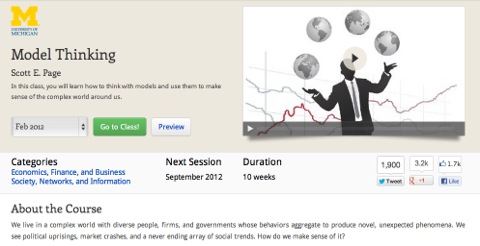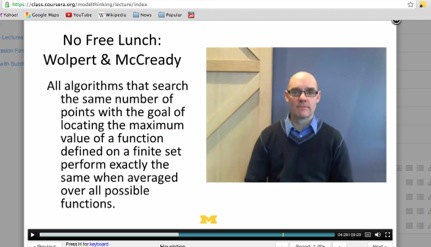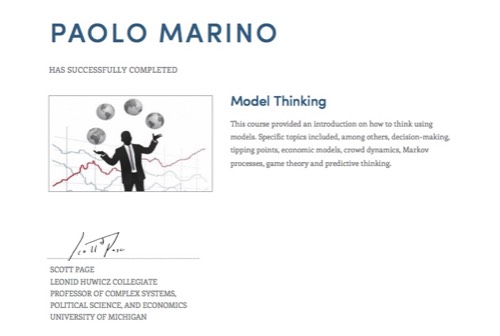
After what proved to be a pretty fun and interesting experience with the AI Course I decided to look for something else to follow online.
The original plan was to go for the DB theory one, but the next installment was farther in the future. At the same time the whole "online course from brick&mortar Universities" was booming, so it didn't take a lot of time to find another candidate.
I opted for Prof. Scott E. Page course on "Model Thinking". Professor Page is primarily a Social Scientist, which is a branch of study I don't have any particular experience with apart from some light reading. In fact I was a bit skeptical that I would really find anything interesting in the course but the description was vaguely inviting so I decided to give it a try.
Here is - from the course homepage itself - the main "topics":
In these lectures, I describe some of the reasons why a person would want to take a modeling course. These reasons fall into four broad categories:
- To be an intelligent citizen of the world
- To be a clearer thinker
- To understand and use data
- To better decide, strategize, and design
Did it work for me? Even considering the low level of effort I tend to put in these things I believe it was a very good idea to take this one. Some of the things I was already acquainted with, at least passingly, and some were things I doubt I will ever be able to use ("Emergent cultural signatures and persistent diversity: A model of conformity and consistency", anyone?) but there were plenty of pointers to interesting stuff, and the description of Categorical and Linear models was a real eye-opener for me.
The structure of the course was different from the AI one. Lectures were longer, and in-lecture quizzes were fewer and farther in between. There was also lots more to read "offline", mostly PDFs of articles or chapters from books, often written or co-authored by Prof. Page (who comes through as a great guy from listening to his lectures, btw).

In the end I got 74.2% which is, admittedly, not very good (the quizzes weren't really hard, in hindsight). But the course (along with some things happening at work) motivates me to get better at statistics, so my next "online course" will probably be an introductory statistics course.
